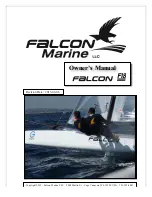
BILGE BLOWERS
The two (2) bilge blowers in the engine room evac-
uates fumes, odors, and excessive heat from the
engine compartment while bringing fresh air in
through the deck vents. Make sure all fumes are
evacuated from the engine compartment prior to
starting the engine. The bilge blower must be run-
ning before and when you start the engine, and
while operating your boat below cruising speed.
The blowers are wired through circuit breakers on
the DC breaker panel located on the aft bilge com-
ponent board and with switches on the control sta-
tion switch panel and on the salon main DC distribu-
tion panel.
Maintenance
Frequently check the bilge blowers to ensure that all
electrical connections are securely in place and that
the blower motors are operating efficiently.
ENGINES
Engines are central to the boating experience.
Engine maintenance must be performed regularly to
ensure optimum performance and care, and to pro-
tect the environment. We highly recommend that
you become thoroughly familiar with all aspects of
the engine’s proper operation as outlined in the
Engine Operator’s Manual. Keep your engine clean
and tuned properly. Check the oil and fluid levels
before every outing. Change the oil according to the
owner's manual.
A general maintenance program consists of proper
lubrication, and cleaning of fuel filters, fuel lines, and
air filters. While washing down, be sure that water
does not enter the air inlets. Water entering the air
inlets when the engines are not operating may go
directly into the cylinders, resulting in rust and pos-
sibly internal engine damage.
Note: The engines are warranted directly by
Volvo Penta, not by Chaparral Boats.
Chaparral highly recommends that you follow the
maintenance and warranty schedule in your Engine
Operator’s Manual included in the owner’s packet.
Engine abuse or improper maintenance may
adversely affect the claims made under the independ-
ent warranty provided by the engine manufacturer.
ENGINE GAUGE PACKAGE
Each of your engines are equipped with an engine
gauge package as a safety feature in the event of an
electrical malfunction resulting in the helm gauges
becoming inoperative.
Gauge packages may differ with different engine
options. Refer to your Engine Operator’s Manual for
proper gauge readings and gauge packaging.
ENGINE EXHAUST SYSTEM
Engine exhaust systems are an important and often
overlooked part of a marine engine. The exhaust
system on Chaparral boats removes harmful gas
created by the engine during combustion. This sys-
tem is designed to allow water from the raw water
cooling system to enter the exhaust system through
elbows where water and exhaust meet. Water and
exhaust are then pumped through the mufflers and
sent overboard through the exhaust outlet. Make
sure water is moving from the exhaust outlet while
the engines are operating.
Inspect the system for leaks before each use. Make
sure all hose clamps and connections are tight and
5-2
WARNING:
Explosion/Fire Hazard – Run blow-
er at least four minutes before starting the
engine or generator. Check bilge and engine
compartments for fumes.
WARNING:
Do not allow obstructions to inter-
fere with bilge blower or ventilation intake oper-
ations. Engine performance may be adversely
affected.
Summary of Contents for 420 PREMIERE
Page 10: ...1 6...
Page 11: ...1 7...
Page 12: ...1 8...
Page 16: ...1 12...
Page 42: ...3 6 Figure 3 5 Hardtop Layout...
Page 44: ...3 8 Figure 3 8 Helm Layout...
Page 68: ...5 6...
Page 87: ...7 15 Figure 7 10 10 Way Fuse Block...
Page 88: ...7 16 Figure 7 11 3 Row Helm Circuit Breaker Panel...
Page 89: ...7 17 Figure 7 12 Bilge Panel...
Page 90: ...7 18 Figure 7 13 Aft Bond Buss 1 Model...
Page 91: ...7 19 18 Figure 7 14 MP3 SW Panel...
Page 92: ...7 20 Figure 7 15 Port Switch Panel 1...
Page 93: ...7 21 Figure 7 16 Port Switch Panel 2...
Page 94: ...7 22 Figure 7 17 Port Switch Panel 3...
Page 95: ...7 23 Figure 7 18 Port Component Panel...
Page 96: ...7 24 Figure 7 19 Starboard Switch Panel 1...
Page 97: ...7 25 Figure 7 20 Starboard Switch Panel 2...
Page 98: ...7 26 Figure 7 21 Starboard Component Panel...
Page 99: ...7 27 Figure 7 22 Bilge Distribution Harness Model 1...
Page 100: ...7 28 Figure 7 23 Bilge Distribution Harness Model 2...
Page 101: ...7 29 Figure 7 24 Bilge Distribution Harness Model 3...
Page 102: ...7 30 Figure 7 25 Bilge Distribution Harness Model 4...
Page 103: ...7 31 Figure 7 26 Bilge Distribution Harness Model 5...
Page 104: ...7 32 Figure 7 27 XAC Cabin Harness Model...
Page 105: ...7 33 Figure 7 28 XSofa Lite Harness Model...
Page 106: ...7 34 Figure 7 29 Galley Overhead Light Harness 1...
Page 107: ...7 35 Figure 7 30 Forward Overhead Light Harness 2...
Page 108: ...7 36 Figure 7 31 Forward Overhead Light Harness 3...
Page 109: ...7 37 Figure 7 32 X009 1300570 Sub Floor Model...
Page 110: ...7 38 Figure 7 33 AC Cabin Harness...
Page 111: ...7 39 Figure 7 34 2010 Volvo IPS Ignition Harness 1...
Page 112: ...7 40 Figure 7 35 2010 Volvo IUPS Ignition Harness 2...
Page 113: ...7 41 Figure 7 36 2010 Volvo IUPS Ignition Harness 3...
Page 114: ...7 42 Figure 7 37 2010 Volvo IPS Ignition Harness 4...
Page 115: ...7 43 Figure 7 38 Hardtop Harness...
Page 116: ...7 44 Figure 7 39 Sunroof Switch Assembly...
Page 117: ...7 45 Figure 7 40 Spotlight Harness...
Page 118: ...7 46 Figure 7 41Grill Outlet Harness...
Page 119: ...7 47 Figure 7 42 Wet Bar Harness Model...
Page 120: ...7 48 Figure 7 43 Wet Bar Outlet Harness...
Page 121: ...7 49 Figure 7 44 Vent Light Harness Model...
Page 122: ...7 50 Figure 7 45 Windlass and Horn 420 DA Model...
Page 124: ...7 52...
Page 138: ...8 14...
Page 156: ...10 6...
Page 164: ...11 8...
















































